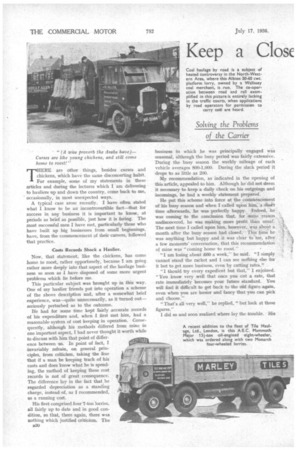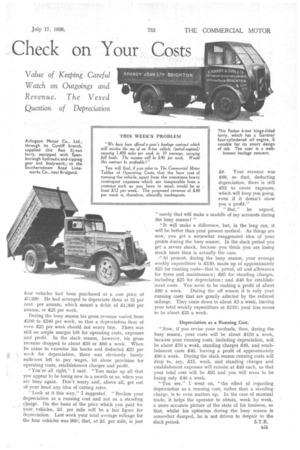Keep a aos€ Check on Your Costs
Page 40

Page 41

If you've noticed an error in this article please click here to report it so we can fix it.
Value of Keeping Careful Watch on Outgoings and Revenue. The Vexed Question of Depreciation
"(A wise proverb the Arabs have)._ Curses are like young chickens, and still come home to roost!
THERE are other things, besides curses and chickens, which have the same disconcerting habit. For example, some of my statements in these articles and during the lectures which I am delivering to hauliers up and down the country. come back to me, ' occasionally, in most unexpected ways.
A typical case arose recently. I have often stated what I know to be anincontrovertible fact—that for success in any business it is important to know, at periods as brief as possible, just how it is faring. The most successful men I have met, particularly those who have built up big businesses from small beginnings, have, from the commencement of their careers, followed that practice.
Costs Records Shock a Haulier.
Now, that statement, like the chickens, has come home to roost, rather opportunely, because I am going rather more deeply into that aspect of the haulage business so soon as I have disposed of some more urgent problems which lie -before me.
This particular subject was brought up in this way. One of my haulier friends put into operation a scheme of the above description and, after a somewhat brief experience, was—quite unnecessarily, as it turned out—. seriously perturbed as to the outcome.
He had for some time kept fairly accurate records of his expenditure and, when I first met him, had a reasonable system of cost keeping in operation. Consequently, although his methods differed from mine in one important aspect, I had never thought it worth while to discuss with him that point of difference between us. In point of fact, I invariably refrain, on general principles, from criticism, taking the line That if a man be keeping track of his costs and does know what he is spending, the method of keeping these cost records is not of great consequence. The difference lay in the fact that he regarded depreciation as a standing charge, instead of, as I recommended, as a running cost.
His fleet comprised four 7-ton lorries, all fairly up to date and in good condition, so that, there again, there was nothing which justified criticism. The
1330 business in which he was principally engaged was seasonal, although the busy period was fairly extensive.
During the busy season the weekly mileage of each vehicle averages 800-1.000. During the slack period it drops to as little as 200.
My recommendation, as indicated in the opening of this article, appealed to him. Although he-did not deem
it necessary to keep a daily check on his outgoings and incomings, he had a weekly statement prepared.
He put this scheme into force at the commencement of his busy season and when I called upon him, a Shalt time afterwards, he was perfectly happy. Indeed, he was coming to the conclusion that, for some reason undiscovered, he was making more profit than usual.
The next time I called upon him, however, was about a month after the busy season had closed. This time he was anything but happy and it was clear to me, after a few moments' conversation, that this recommendation of mine was "coming home to roost."
"I am losing about MI a week," he said. "I simply cannot stand the racket and I can see nothing else for it but to get more business, even by cutting rates."
"I Should try every expedient but that," I enjoined.
"You know very well that once you cut a rate, that rate immediately becomes your future standard. You will find it difficult to get back to the old -figure again, even when you are busier and fancy that you can pick
and choose."
"That's all very well," he replied, " but look at these figures."
I did so and soon realized where lay the trouble. His four vehicles had been purchased at a cost price of £5,200. He had arranged to depreciate them at 25 per cent. per annum, which meant a debit of 11,300 per annum, or £25 per week.
During the busy seasoil his gross revenue varied from £200 to £240 per week, so that a depreciation item of even £25 per week should not worry him. There was still an ample margin left for operating costs, expenses and profit. In the slack season, however, his gross revenue dropped to about £50 or £60 a week. When he came to examine his books and deducted £25 per week for depreciation, there was obviously barely sufficient left to pay wages, let alone provision for operating costs, establishment charges and profit.
"You're all right," I said. "You make up all that you appear to be losing now in a month or so, when you are busy again. Don't worry and, above all, get out of your head any idea of cutting rates.
'Look at it this way," I suggested. "Reckon your depreciation as a running cost and not as a standing charge. On the basis of the price which you paid for your vehicles, 2d. per mile will be a fair figure for depreciation. Last week your total average mileage for the four vehicles was 960; that, at 2d. per mile, is just £8. Your revenue was £60, so that, deducting depreciation, there is still £52 to cover expenses, which will keep you going, even if it doesn't show you a profit" "But," he argued, a muddle of my accounts during "surely that will make the busy season?"
"It will make a difference, but, in the long run, it will be better than your present method. As things are now, you get a somewhat exaggerated idea of your profits during the busy season. In the slack period you get a severe shock, because you think you are losing much more than is actually the case.
"At present, during the busy season, your average weekly expenditure is £130, made up of approximately £25 for running costs—that is, petrol, oil and allowance for tyres and maintenance ; £65 for standing charges, including £25 for depreciation; and £40 for establishment costs. You seem to be making a profit of about £80 a week. During the off season it is only your running costs that are greatly affected by the reduced mileage. They come down to about £5 a week, leaving your total weekly expenditure at £110; your. loss seems to be about £55 a week.
Depreciation as a Running Cost.
"Now, if you revise your methods, then, during the busy season, your costs will be about £150 a week, because your running costs, including depreciation, will be about £70 a week, standing charges £40, and establishment costs £40, leaving a profit of approximately £60 a week. During the slack season running costs will drop to, say, £15, week, and standing charges and establishment expenses will remain at £40 each, so that your total cost will be £95 and you will seem to be losing only £40 a week.
"You see," I went on, "the effect of regarding depreciation as a running cost, rather than a standing charge, is to even matters up. In the case of seasonal trade, it helps the operator to obtain, week by week, a more accurate picture of the state of his business, so that, whilst his optimism during the busy season is somewhat damped, he is not driven to despair in the slack period. S.T.R.




















































































